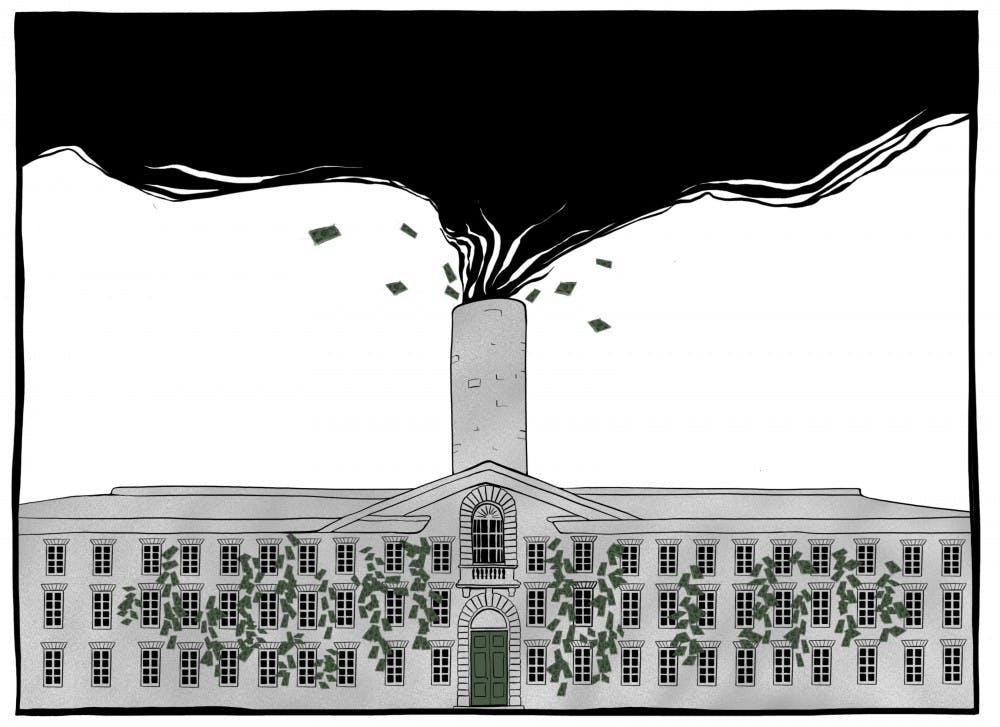Spring approaches. Thesis deadlines loom. And the pressure to find a job mounts. Last semester, Exxon Mobil graced the grounds of Princeton campus as part of the Fall HireTigers Career Fair. All the while, the college divestment movement is gathering steam. Georgetown, sometimes regarded as more conservative than many of its peers, divested. Almost 400 members of Harvard’s faculty issued a letter in support.
President Eisgruber has repeatedly defended the ludicrous claim that divestment from fossil fuels would somehow be more “political” than investment. Most recently, he argued that the most polluting companies are simply responding to consumer demand, and that the University’s divestment would be merely symbolic.
That Princeton’s ongoing investment in an industry determined to maximize short-term profit at the expense of the literal survival of current and future generations is immoral probably does not need to be expounded upon as much as pointed out over and over until someone in a leadership position is embarrassed enough to push for change. Despite his efforts to obfuscate, that person is President Eisgruber, as well as the board of directors of PRINCO, which manages Princeton’s investments.
And while students from Yale and Harvard are storming the field to promote divestment, a large portion of Princeton’s senior class is soon gearing up to storm the offices of the very industries that fuel the climate crisis. Sure, few Princetonians suit up for Exxon after graduation. But many of the banks, investment groups, and consulting firms that Princeton students work for are going to bat for Exxon and friends even if they are not wearing the uniform.
Consider the post-graduation career outcomes survey for my own Class of 2016. The largest block of graduates (18.9 percent) is in the “Professional, Scientific, & Technical Services” category, which is often code for “consulting.” Some are better than others, no doubt, but generally Princeton favorites like McKinsey have helped the oil and gas industry (and authoritarian regimes like Saudi Arabia — oops!) figure out how to most efficiently plunder the planet for personal profit — not to mention bankrupt and sicken the working class.
The next largest block, with 14.1 percent of my classmates, is “Finance & Insurance,” where names like JPMorgan Chase, which has poured more than $196 billion into the fossil fuel industry since the Paris Climate Accord, crop up. The third tier is “Information” (Google, Microsoft, Facebook) at 6.8 percent, and, well, you get the point.
By contrast, the fields of politics, research, medicine, legal services, education and teaching, social advocacy, museums, and local government clocked in at a combined 18.6 percent of my classmates. That list includes non-profits like Princeton University.
The fact is, most University graduates are not “In the Nation’s Service and the Service of Humanity.” Instead, we doff our graduation caps and ride into the sunset to work in the service of bad corporate actors that aid and abet the fossil fuel industry. But why?

Most first-years do not walk through FitzRandolph Gate and plan on becoming consultants for large companies. A friend from the University of Texas at Austin remarked to me that his business school classmates who are working at banks had a special ire for the University because they would find that, several years into their career, recent University art history graduates would be hired to do the same job.
As an upperclass student considering my future career, I found that the vast majority of resources were dedicated to consulting, finance, and tech. Those are the companies that are invited to recruit students, and if you aren’t interested in one of those pathways or more schooling, the University is not entirely sure what to do with you. Eventually, it just becomes easier to apply; they’re accessible and you probably know many people that work there.
Just as it funnels money directly into the fossil fuel industry, the University funnels students into companies that are tacitly responsible for the destruction of the natural world. We should divest our money and our people from those industries by refusing to allow notoriously immoral companies like McKinsey and JPMorgan to recruit on campus or advertise through our career services websites. As some small penance for our decades of contributions to the climate crisis, we should actively seek out and waive fees for environmental, economic and social justice organizations to recruit and advertise. We should take people with a vested interest in the fossil fuel industry like James Forese, the President of Citigroup, off PRINCO’s board of directors.
The 12 years that the Intergovernmental Panel on Climate Change warned we have left to to dramatically reduce carbon emissions have dwindled to 10 after a record-breaking year for global emissions. Institutions with power and prestige like Princeton are either throwing all of their weight behind the effort to save our planet or they are perpetuating its destruction. There is no middle ground.

Victoria Higgins in a graduate of the Class of 2016. She can be reached at victoriahiggins14@gmail.com








